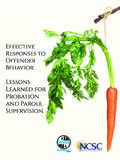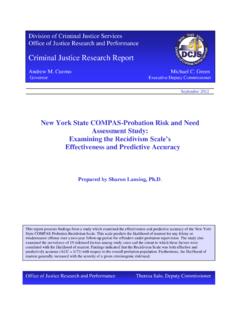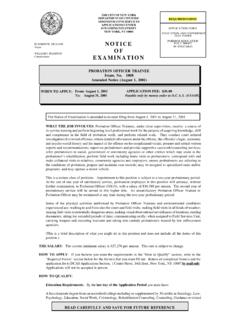Transcription of Community Service - Texas Probation
1 1 Community Service The law dealing with Community Service has changed over the years. While the requirement that a probationer could be ordered to perform Community Service as a condition of supervision had been previously inferred, it was not until the 1980's that statutory language was created to expressly authorize a judge to impose this particular condition. See Fogle v. State, 667 S. W. 2d 296 (Tex. App. - Dallas, 1984) Initially, Community Service was mentioned in Article , Section 11 as one of the reasonable conditions of Community supervision that a court could impose on a probationer.
2 Section 11 (a) (10) provided that: Terms and conditions of Probation may include, but shall not be limited to, the conditions that the probationer shall: (10) Participate, for a time specified by the court in any Community -based program, including a Community - Service work program designated by the court. Then, in 1989 the Legislature expanded the meaning of Community Service . Originally, Community Service was divided into two categories -- work Probation and Community Service . Article , Section 16, Code of Criminal Procedure (1990), stated that a court granting Probation to a defendant convicted of a felony had to require as a condition of Probation that the defendant work in a supervision work program, unless the court determined that the defendant was physically or mentally incapable of participating in the work program or that participating in the work program would work a hardship on the defendant or the defendant s dependents.
3 The amount of work hours authorized under this section could not be less than 24 hours and could not be more than 1,000 hours. In addition, the court could not require the defendant to work more than eight hours during any week. Although work Probation was not defined under this section, it was contemplated that a Probation department would enter into contracts with state agencies or political subdivisions or nonprofit organizations that served the public good by providing assistance to the poor, assisting the elderly, or performing other projects that benefits the Community for the utilization of probationer labor.
4 Article , Section 17, Code of Criminal Procedure, (1990), provided that if the court placed a defendant on Probation , the court could require, as a condition of the Probation , that the defendant work a specified number of hours at a specified Community Service project for an organization named in the court s order. The amount of Community Service specified under this section: 1) could not exceed 1,000 hours and could not be less than 320 hours for an offense classified as a first degree felony; 2 2) could not exceed 800 hours and could not be less than 240 hours for an offense classified as a second degree felony; 3) could not exceed 600 hours and could not be less than 160 hours for an offense classified as a third degree felony.
5 4) could not exceed 200 hours and could not be less than 80 hours for an offense classified as a Class A misdemeanor or for any other misdemeanor for which the maximum permissible imprisonment, if any, exceeded six months or the maximum permissible fine, if any, exceeded $1, ; and 5) could not exceed 100 hours and could not be less than 24 hours for an offense classified as a Class B misdemeanor or for any other misdemeanor for which the maximum permissible imprisonment, if any, did not exceed six months and the maximum permissible fine, if any, did not exceed $1, In 1991, the Legislature retained the work Probation statute but instead of making work Probation mandatory.
6 The law stated that a court granting Probation to a defendant convicted of a felony could require as a condition of Probation that the defendant work a specified number of hours under Section 17 of Article , or work a specified number of hours in a supervision work program authorized under this section. In 1993 the Legislature made substantial changes to the provisions in Article , Code of Criminal Procedure, authorizing Community Service . First, the Legislature eliminated in its entirety the section dealing with work Probation . In its place, the Legislature retained Article , Section 16, authorizing Community Service .
7 This section now required a judge to impose, as a condition of Community supervision, a requirement that the defendant perform a specified number of hours of Community Service . Moreover, this requirement was applicable to both felony and misdemeanor cases. The number of hours that the court must imposed was also modified to provide as follows: 1) not to exceed 1,000 hours and not to be less than 320 hours for an offense classified as a first degree felony; 2) not to exceed 800 hours and not to be less than 240 hours for an offense classifed as a second degree felony; 3) not to exceed 600 hours and not to be less than 160 hours for an offense classified as a third degree felony; 4) not to exceed 400 hours and not to be less than 120 hours for an offense classified as a state jail felony.
8 5) not to exceed 200 hours and not to be less than 80 hours for an offense classified as a Class A misdemeanor or for any other misdemeanor for which the maximum permissible confinement, if any, exceeded six months or the maximum permissible fine, if any, exceeded $4,000; and 6) not to exceed 100 hours and not to be less than 24 hours for an offense classified as a Class B misdemeanor or for any other misdemeanor for which the maximum permissible confinement, if any, did not exceed six months and the maximum permissible fine, if any, did not exceed $4,000. 3 The only way that a defendant could avoid the imposition of Community Service was if the judge determined and noted on the court s order that: 1) the defendant is physically or mentally incapable of participating in the project; 2) participating in the project will work a hardship on the defendant or the defendant s dependents; 3) the defendant is to be confined in a substance abuse punishment facility as a condition of Community supervision; or 4) there is other good cause.
9 In addition, this provision now stated that the judge must order that the defendant work a specified number of hours at a Community Service project or projects for an organization or organizations approved by the judge and designated by the department .. The above change was made in response to the Texas Court of Criminal Appeals decision in Lemon v. State, 861 S. W. 2d 249 (Tex. Cr. App. - 1993) in which the court ordered a defendant, placed on Community supervision for the offense of misapplication of fiduciary property valued over $10,000 but less than $100,000, at such times and places as may be directed by the adult Probation officer, perform the following number of hours of Community Service : 1000.
10 The defendant appealed the imposition of this particular condition of Community supervision. The Court of Criminal Appeals observed that the authority for a trial court to require Community Service as a condition of Probation is found in two sections of Article of the Code of Criminal Procedure. Section 17 (a) stated that: If the court places a defendant on Probation , the court may require, as a condition of the Probation , that the defendant work a specified number of hours at a Community Service project or projects for an organization or organizations named in the court s order.





